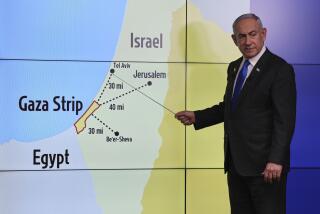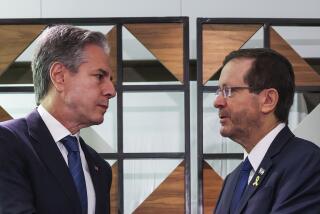Mubarak Asks Israelis to Push for Peace
JERUSALEM — In a blunt appeal to the Israeli people, Egyptian President Hosni Mubarak called Wednesday for pressure on the Jerusalem government to make a key concession for peace.
He told a group of Israeli journalists, summoned to Cairo for a rare interview, that “only you Israelis are complicating the issue, and I emphasize this,” of arranging direct talks with a Palestinian delegation. Segments of the two-hour interview were broadcast Wednesday evening on Israel Radio.
Mubarak, who has agreed to try to bring the Israelis and Palestinians together, put his finger on the contentious question of trading land for peace, an element of U.N. resolutions designed to settle the four decades of conflict between the Israelis and Palestinians.
“I call on Israel to tell its government to agree with the principle of territories for peace,” Mubarak said in a direct political pitch to a foreign populace. “Don’t you have to give me something for peace?”
His remarks probed a point of division between Israel’s Likud and Labor parties, the twin pillars of the coalition government, which are sharply divided over Mubarak’s initiative.
Prime Minister Yitzhak Shamir, head of Likud, had declared earlier Wednesday that if all Israeli parties remain faithful to his own plan, which makes no mention of land for peace, “unity will be preserved.”
Later, in response to Mubarak, a bristling David Levy, deputy prime minister and a Likud hard-liner, accused the Egyptian of interfering in Israel’s internal affairs.
Mubarak, in the news conference, insisted that Yasser Arafat, head of the Palestine Liberation Organization, “agrees to a dialogue with two delegations” to discuss the Israeli plan for elections in the occupied territories that would lead to Palestinian self-rule. Arafat, however, has publicly rejected the Israeli plan and so far has not publicly endorsed the Egyptian president’s proposed modifications.
The Partner Israel Needs
Acceptance of any dialogue could provide the Israelis with the negotiating partner they need to invigorate their election plan.
The Egyptian initiative, which Mubarak discussed Monday in Cairo with Israeli Defense Minister Yitzhak Rabin, seeks in part to fill in deliberate blanks in Shamir’s plan, such as the principle of trading land for peace, which is generally interpreted as meaning that the Israelis would release control over all or part of the occupied West Bank and Gaza Strip. Shamir and his fellow Likud Party members have ruled out any discussion of the issue.
Another controversial proposal in Mubarak’s 10-point list of modifications endorses a Palestinian delegation including members from outside the occupied territories. Likud opposes this formula on the presumption that any outside member would directly represent the PLO, which Israel has long refused to recognize or deal with on grounds that the PLO is a terrorist organization.
In an apparent reference to this issue, Mubarak told the Israelis: “You Israelis are like people knocking their heads against the wall. Don’t you know that the Palestinians in the territories can do nothing without a green light from Palestinians on the outside?”
Some Israeli politicians, including Labor Party leader Shimon Peres, have entertained the idea that Palestinians deported from the occupied territories might be acceptable as outside members of a Palestinian delegation.
Rabin, Labor’s other top leader, declared Monday on his return from Cairo that Mubarak had agreed to name and announce a Palestinian delegation but that the Israeli government would be consulted. The list, he said, would be formed after talks among “all elements involved, which I will not detail, but including Israel.”
The consulting elements he refused to detail presumably could include the PLO, however, with Mubarak as the middleman. There would be no direct Israeli-PLO talks, but an indirect line of communication, similar to the U.S.-PLO talks, would be established.
More to Read
Sign up for Essential California
The most important California stories and recommendations in your inbox every morning.
You may occasionally receive promotional content from the Los Angeles Times.










